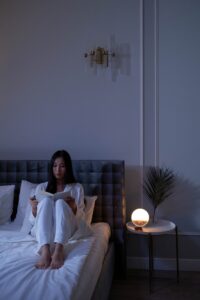 Do you have trouble falling asleep or staying asleep throughout the night? No matter how tired or exhausted you are, you can’t seem to quiet your mind enough to relax and fall asleep. Maybe you actually can’t remember the last time you had a good night of sleep.
Do you have trouble falling asleep or staying asleep throughout the night? No matter how tired or exhausted you are, you can’t seem to quiet your mind enough to relax and fall asleep. Maybe you actually can’t remember the last time you had a good night of sleep.
Instead of counting sheep, you’re counting the number of hours you’ll get if you fall asleep right at the present moment. Unfortunately, with each passing minute, your number of hours is reduced.
Nighttime anxiety is a struggle many people face. Fortunately, there are ways to address it.
Create and Follow a Bedtime Routine
One of the best things that you can do to try to reduce some of your nighttime anxiety is to create and follow a bedtime routine. Aim to go to bed around the same time each night and wake up around the same time each morning. And, yes, this includes weekends.
Setting up a routine and sticking with it will help your body and mind naturally fall into the rhythm. In fact, if you have a routine that you follow before you even head to bed, you will train your body to know it’s time to go to sleep, and it will naturally start to rest and unwind.
 Here’s an example of a nighttime routine:
Here’s an example of a nighttime routine:
- Make a cup of herbal tea
- Take a shower
- Brush your teeth
- Set your alarm
- Turn off all screens (Television, phones, etc.)
- Read in bed for 30 minutes
- Play quiet, relaxing music or a “bedtime story” on a mindfulness app
- Turn off all lights
Start Journaling
Journaling is a great way to put all of those thoughts that are floating around in your head onto the pages of your journal instead. You’re giving those thoughts a place to go instead of allowing them to stay inside of you itching to get out.
Write down what you’re thinking about, how you’re feeling, and why you may be experiencing these thoughts and emotions. Journaling is also a great tool to look back on later to see the progress you’ve made or any coping mechanisms that may have worked for you.
Practice Meditation
Practicing meditation is a great way to keep yourself grounded and bring you back to the present moment. A lot of anxiety stems from worrying about things from your past or things that haven’t even occurred yet in the future.
Meditating helps you quiet your mind and reduce your stress during the day. You can meditate at any time during the day, but meditating right before bed may be a great way to relax your body and mind to get in the right headspace before falling asleep.
Move Your Body
Exercising is a great way to naturally reduce any stress or anxiety. You don’t have to exercise for hours on end to seek the benefits of this either. All it takes is moving your body for around thirty minutes each day.
You can move your body in whatever way you enjoy the most. Go for a walk around your neighborhood. Hop on your bicycle or indoor cycling bike. Head to a class with a friend. You can even roll out a yoga mat and practice yoga in the comfort of your own home. Exercising is also a great way to help you fall asleep faster at night.
 Seek Additional Support
Seek Additional Support
Sometimes, a little additional support is required. If you’re still struggling with nighttime anxiety, you’re not alone. Reaching out to a licensed and trained outside third party may be exactly what you need.
A therapist will work with you to help you get to the root cause of your anxiety. They’ll be able to help you work through your different thoughts and emotions, as well as help you find different ways to cope that you may not have thought of yet.
If you’re interested in therapy for your anxiety, reach out to me today to set up a consultation. And you can learn more about counseling for anxiety here.





